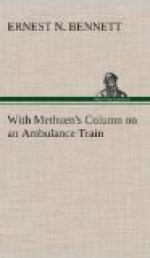At a station lower down a lighter incident took place. A corporal from our train, a Johannesburg man, in taking a short stroll came across three Uitlander volunteer recruits. They did not for the moment recognise their quondam acquaintance in his uniform, so he called “Halt!” The recruits became rigid. “Medical inspection,” cried the corporal—“Tongues out!” Three tongues were instantly thrust out. “Salute your general,” was the next order. This was too much. In the middle of a spasmodic attempt at a salute a dubious look began to spread over the faces of the three victims, which broadened into certainty as with a yell they leapt upon their oppressor and made him stand them a drink.
At Richmond Road we came across a detachment of Cape Volunteers who were practising the capture of kopjes in the neighbourhood of the line. In condoling with one of them on the dreariness of the place, he remarked that they occasionally shot a hare with a Lee-Metford bullet. This is pretty good shooting if the hare is moving. I remember hearing a Boer say with apparent bona fides that he invariably shot birds on the wing with Mauser bullets. Some of his birds must have looked ugly on the table.
As we passed through the Karroo somebody remarked that a Cape newspaper had suggested that our yeomen should ultimately settle in the country and continue their pastoral life in the veldt-farms of South Africa. Evidently the journalist who wrote this article imagines that our gallant yeomen were all tillers of the soil. Even if they were, few Englishmen will care to exchange the green fields and leafy copses of England for the solitude of these dreary, sun-baked plains. Moreover, where is the land to come from for any considerable number of such settlers? Practically all the land which is worth cultivating in the colonies of South Africa and the two Republics is already occupied. Even if we confiscate the farms of those colonial rebels actually and legally proved to be such, I doubt very much whether the land thus obtained would provide for more than three or four hundred settlers. Enthusiasts in England who write to the papers on this topic seem often to take for granted that the farms of the burghers in the two Republics will at the close of the war be presented to any reservist or yeoman who wishes to settle in South Africa. But is there any precedent in modern times for the confiscation of the private property of a conquered people? Are the burghers who survive the struggle to be evicted from their farms and left with their wives and children to starvation? This would be a bad beginning towards that alleviation of race hatred after the war which all good men of every political party earnestly desire. There is, it is true, a certain amount of land owned by the State in the Transvaal, but if we distribute this gratis to a few hundred individuals we shall be depriving ourselves of one of the few sources from which a war-indemnity could accrue to the nation as a whole.




